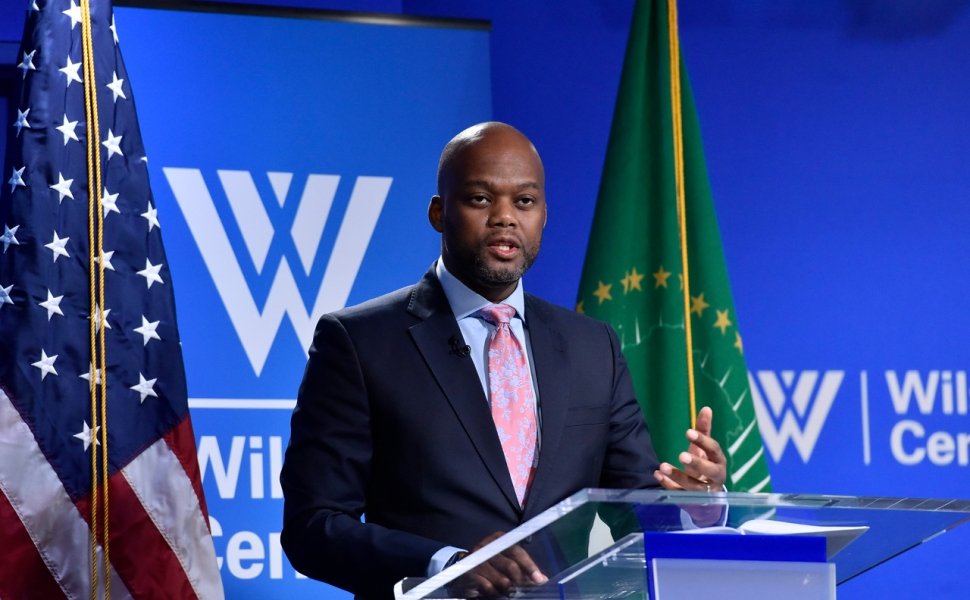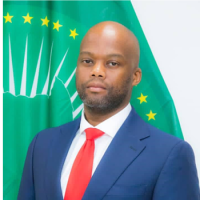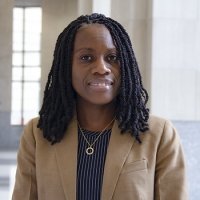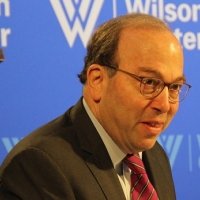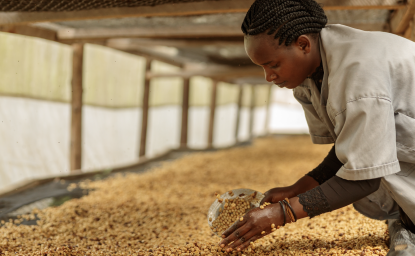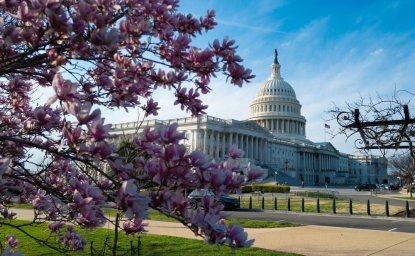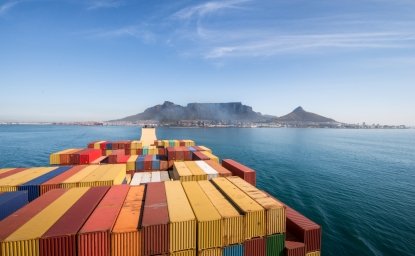This transcript has been lightly edited for length and clarity.
Oge Onubogu: [00:00:00] Welcome back to the Wilson Center Africa Program's podcast beyond a single story. My name is Oge Onubogu, and I'm joined by my co-host Witney Schneidman. On this episode, we are excited to welcome the Secretary General of the African Continental Free Trade area, Wamkele Mene. Since 2020 Wamkele has led the implementation of the African Continental Free Trade Area agreement, as well as strategic collaboration, stakeholder engagement, and resource mobilization for the implementation of the agreement. With Wamkele, we discussed the future of African trade in markets, we talked about how the African continental free trade area is set to become the largest regional trade area in the world, and we discuss how countries like the US can partner, advance, and benefit from the African free trade area. And now our [00:01:00] conversation with Secretary General Wamkele Mene. Wamkele, thank you so much for joining us today.
Wamkele Mene: Thank you very much.
Oge Onubogu: So we're going to dive right into the conversation and let's do a little bit of scene setting because we talk so much about the African continental free trade area.
We know not everyone knows about, uh, what the AfCFTA is. Um, so help us set a scene here. Give us an overview of what the African continental free trade area is. Where do current implementation stand and what are your goals, uh, for the African Continental free trade area?
Wamkele Mene: Well, thank you very much.
Again, let, me start with the latter part of, of, uh, your question. The goal is very, very simple. To create a single market in Africa, uh, and to create a single rule book for trade and investment for the last almost 70 years now, [00:02:00] um, the fragmentation on the continent of Africa has been, um, getting more and more entrenched.
And an example of that, if you are in Nigeria, you want to trade with somebody in Kenya. You have to use W2 rules to trade amongst African countries. This was the extent of the fragmentation that that existed and to an, that still exists to some degree. So the AfCFTA is intended to reverse all of that, to overcome all of that, to create a single market.
And that single market includes trading services, trading goods, investment, the digital economy, intellectual property rights, and so on. As we speak today, there are 48 countries that have ratified the agreement establishing the AfCFTA. Um, so there will be a 49th country that is Madagascar. And so in [00:03:00] less than, in less than six years, we've been able through political will of our heads of states, we have moved rapidly in ratifications.
And ratification, as you know, means you accept the rights and obligations of the treaty in this case. Uh, the right to enter, for example, to enter a new market, to be given access to a new market, the obligation to open your own markets, the obligation to open your investment markets, and, uh, um, and similarly in the area of services where the focus is on eliminating regulatory barriers to, to services trade.
So we, we are, we are now in the mode of implementation of the agreement. We've shifted from negotiations. We concluded all of the negotiations of the protocols in less than five years, and we are now in full implementation mode [00:04:00] with trading, uh, happening across, uh, the continent on the basis of the preferences and the rules of the AfCFTA.
Oge Onubogu: And I know in 2021 we were actually privileged to host you at the Wilson Center as part of our Brown Capital Management Africa forum where you gave our first biannual lecture. And at that, uh, event, you had actually mentioned that you coming to the US that was your first international trip since you were appointed Secretary General of the African Continental free trade area.
I know a lot has changed since then, and it it'd be good to get your sense about why you see the US as being important to helping with intra African trade, and how do you see US Trade and African countries evolving? Especially at this time, in this moment where we are today?
Wamkele Mene: We shared the belief that trade must benefit everybody, particularly small, medium [00:05:00] enterprises, young people, and women led businesses and that the benefits of trade must not accrue only to large corporations. And that was the basis of our memorandum of understanding, which we signed with, um, with the USTR.
And so that was a starts to a very good collaboration with the USTR at that time. Of course, the world is a very different place now, and so the question for us as Africans is how do we navigate. Well, uh, I think the, the way to, for us to navigate that is to consolidate the domestic market in Africa.
By that I mean the AfCFTA to accelerate its implementation. There may be, uh, countries that are much lower than others. Of course, the continent of Africa, the AfCFTA comprises 48 state parties, as I said earlier, and so we've got to move very, very fast to create a market [00:06:00] that is significant enough.
1.4 billion people with a combined purchasing power parity, GDPU, of $6.8 trillion. So it is a significant market that does enable the self-sufficiency of the African continent in the context where we see this geo-economic tensions. But for Africa is an opportunity to accelerate our ambitions for creating a domestic market.
Witney Schneidman: Let, let me jump in here. In the five years that you have been implementing the AfCFTA. Which sectors have you seen shown the first signs of, of response and where should we be looking for the early signs of, uh, progress?
Wamkele Mene: We are seeing the services sector moving very rapidly, which is very encouraging.
So for example Access Bank, a Nigerian bank, has just acquired an asset in South Africa. A very substantial asset, by the way. We [00:07:00] are seeing also a lot of interest in the financial services sector in general, but in particular banking in Ethiopia, moving into Ethiopia, we're seeing also the telecoms sector.
Being interested in expanding into new markets on the back of the AfCFTA. In fact, many governments that advancing their economic reforms, far reaching economic reforms are doing so in part because they've undertaken the obligations of their AfCFTA, which is Africa's number one reform agenda.
So perhaps we should not have been surprised, but it is a services sector that is moving relatively fast. The manufacturing sector is of course subject to infrastructure constraints, transporting logistics, uh, constraints. They are a very significant factor in how fast or slow [00:08:00] they make use of their agreement.
But in general, I'm satisfied that in the short space of time that we've been implementing this, we've made good progress. We've got a long way to go. Of course. But in a short space of time, we've made very, very good progress.
Witney Schneidman: And, and can you just comment on how the digital protocol has worked with, uh, expansion of services in the region?
Wamkele Mene: The, the AfCFTA protocol on digital trade is actually the first of its kind around the world. There is no other legal instrument around the world that is as comprehensive and that provides such a comprehensive. Regulatory framework for the digital economy. You do get in NAFTA. You get some provisions there that speak to the digital economy.
And if you look at also the trade arrangement, uh, in ASEAN, they've got some provisions. We've taken a different approach. [00:09:00] We've told ourselves that we're going to have a comprehensive. Ambitious and far reaching set of provisions on, uh, uh, to anchor Africa's digital economy. So some of the provisions include.
Payments enabling a seamless interoperable continental payments system and being technology neutral and and play a neutral so that any private sector entity or central bank can take advantage of this significant market and establish a payments capability. We've also ensured that there no longer a prohibition on the movement of data across borders, except of course in in relation to security.
The private sector is interested in commercial data and Eco Bank being able to move their commercial data from [00:10:00] Mozambique to lame where they're headquartered. And so the ability to move data really is in sync with the direction of the digital economy. We also have provisions that prohibit the localization of computing services because we want to encourage digital public infrastructure to be established, investors to come and invest in Africa's digital public infrastructure.
And so with that goal, it does not make sense to limit computing services to a particular jurisdiction. Uh, so we are trying to create a single digital marketplace, uh, by this protocol, and it has been very well received by small technology and big tech, and it is forward looking. It positions the continent of Africa for competitiveness in the global economy.
Uh, a study indicated that Africa, by the year 2035, will [00:11:00] require over 700 data centers as the digital economy continues to grow. We already see this happening in Nigeria, in Rwanda, in Kenya, in May, Kabul Verde will, will launch the largest data center on the Afghan continent. And they are doing so hoping to position themselves as a small island economy, but to focus on the services sector.
So I think this legal instrument not only will enable inclusion through some of the provisions in it that relate to small native enterprises skills, uh, digital skills development, um, inclusion is, is at the heart, as I said earlier, of what we're trying to achieve, but it'll also enable the continent of Africa to develop its own technology platforms.
So that we don't stream everything that, that we [00:12:00] get in Africa or use platforms that are outside of Africa that take revenue outside of Africa. We want to welcome global investors, but welcome them to invest in Africa. To establish a commercial presence in Africa, whether it is through investing in infrastructure, in digital infrastructure, and see commercially priced returns on their investment, or if indeed it is partnering with governments to build digital public infrastructure.
So I'm very excited about this protocol.
Oge Onubogu: This is really impressive. I'm getting really excited hearing you talk about this. So I, I appreciate that you're really excited about this new initiative and, you know, you've spoken a lot about how the, the AfCFTA can help to advance African industrialization and, and one of the comments that I've often heard you make is about ensuring that products are truly made in Africa, not just [00:13:00] product finalization. So I'm wondering if you could expand a little bit what needs to be done to make headway towards ensuring that African industrialization and manufacturing really benefits, uh, the African people to you really achieving that vision of truly made in Africa products.
Wamkele Mene: We, we've got to do three things. Uh, two of them were already on track. First we have to implement Africa's industrialization strategy. So the policy is there. It was adopted. We set out a strategy for Africa's industrialization, focusing on key sectors of economic growth, the backbone of Africa's economy, agriculture, and agroprocessing.
The value addition of, of minerals processing, uh, of minerals in Africa. This is all part of our industrial development strategy. The second component, which is important, is trade policy. We [00:14:00] now have trade policy, the trade rules, the AfCFTA, that enable us to develop a market for that industrialization and the production that happens in that industrialization strategy.
These are relatively, and I use the word relatively advisedly, these are relatively easy to achieve. The third and most important and probably more difficult component is investing in that industrialization. And this is where our development finance institutions have a very, very important role to play.
Afriexim Bank, AFDB, Africa Finance Corporation, Africa 50 and other regional development finance institutions, so that they leverage their balance sheet for risk mitigation to enable investment in Africa's manufacturing capability. Uh, for example, the the Dangote Group [00:15:00] have built successfully one of the world's, if not the largest refinery in the world, so that the processing happens in Africa and that Africa begins to export processed commodities - petrolium in this case - and export it within the AfCFTA market.
That took a very significant determination by our development finance institutions to invest in that refinery. So the three components are, are absolutely key and are complementary. You develop an industrialization strategy, you implement it along with the trade policy. Then the development finance that is required to invest must certainly be there.
I am most grateful that we do see progress in this regard. There are a number of projects on the continent where our development finance institutions have stepped up and have provided the investment that is required [00:16:00] for us to take advantage of this significant market.
Witney Schneidman: Great. Let me just shift to the complementarity between AGOA and the AfCFTA. As you know, AGOA set to expire at the end of September this year. From your vantage point, what needs to be done to AGOA to ensure that it's working hand in hand with the implementation of the AfCFTA?
Wamkele Mene: With the previous administration, we had come to an agreement during the most recent AGOA forum, the US, African Union and ourselves. We had agreed that Agoa should not contribute to Africa's fragmentation. There are those who are in there, those who are out. How do we make sure that Agoa supports regional continental integration in Africa? Uh, so we have North African countries are not in AGOA. So how do we develop [00:17:00] tools that, um, as much as North African countries are not in a agoa, that will still at the very least, support the implementation of the AfCFTA and not cause fragmentation?
So we had agreed, and we had made very, very good progress in that regard. Second, we had agreed that. Trade rules such as investment competition must be aligned. Whatever trade rules on the new generation issues, whatever trade rules are agreed to, they must be aligned with the AfCFTA. And I thought that that was a very, very sensible way to proceed going forward.
I really do not know what is going to happen. Um, but whatever happens, regardless of the path that the new administration takes and Senate, uh, and Congress, I think that the baseline should be the AfCFTA the rules that we already have, which by the way, cover [00:18:00] areas of interest of, of, of US companies investment protection.
Intellectual property rights, a protection of intellectual property rights, a dispute settlement, uh, uh, function that is, that is credible. All of these things after the, the digital economy that we, we just talked about, all of these things the US investors have an interest in, and so the task will be easier this time around, as opposed 25 years ago.
Because we have a baseline of rules that we can invoke those rules in any negotiation to set out the parameters so that we don't move backwards, and so that we don't contribute to fragmentation and reversal of the gains that we've made through the AfCFTA
Witney Schneidman: One of the most important dynamics over the last decade is how competitive the African market has become and how many partners have come forward recognizing the [00:19:00] opportunity there.
And I think what, when the goal was first passed, it was passed on the idea of mutual benefit and mutual gain. So hopefully that will be sustained as, uh, as, as we go forward.
Wamkele Mene: I hope so. I certainly hope so that, uh, whatever, you know, whatever outcome there is. Whether it is the continuation of a agoa with some notifications that I've mentioned, uh, that support, that seek to support, uh, regional integration, economic integration in Africa, or if we, if we ship, uh, to, uh, towards, uh, free trade agreements.
I, I certainly hope that it'll, it'll continue to be a win-win situation.
Oge Onubogu: With South Africa's presidency of the G 20, and looking at the visions that have been set and um, the visions that have been set through the African continental free trade area and other, um, African continental bodies too as well, do you see this presidency of the G 20 as an opportunity [00:20:00] to also advance some of the messages that you've been, you've been sharing?
Wamkele Mene: When the presidency of the G 20 passed on to South Africa was uh, very clear that this G 20 presidency is for the entire continent of Africa.
When the heads of states met for their annual summit in Addis Ababa last month, this was, uh, welcomed as an opportunity for the entire continent of Africa. I believe South Africa recognizes that, uh, the desire for success is not just for South Africans, it is for the entire continent. We have been working together to identify areas of priority. One of them is digitization of Africa's economy. The second, of course, is consistent with the theme, uh, for this year is an economic growth that is, uh, equality of opportunity across, uh, members of the G 20. [00:21:00] And of course the third important aspect is on investment, the continent of Africa, making a, an investment proposition on a leveraging on the AfCFTA, uh, the last, the, the first meeting, uh, I'm sorry, not the last, the first meeting or minutes as a foreign affairs of the G 20 that was held, uh, in Johannesburg, uh, last month was, was, uh, a great success.
It was very, very encouraging. To hear global partners, members of the G 20 commit to the themes that South Africa has chosen at the digitalization of the economy, investment and trade strengthening, uh, multilateralism, every minister who took the floor recommitted, uh, his or her country, uh, to, to the theme.
So I believe that, uh, we will have a, um, a successful G 20. As the African Union, and in particular as [00:22:00] the AfCFTA, we are providing technical support. In areas where the African Union and the government of South Africa where they have requested us to be part of those technical teams.
Oge Onubogu: Thank you so much.
2025 is definitely going to be a very busy year and exciting year for the African continent. And so thank you for, for spending this time with us. We're glad that there are people like yourself and others who are leading institutions that are driving these conversations, um, on the continent. So thank you.
Wamkele Mene: Thank you very much and thank you to you and thank you to you also. Uh, Witney, thank you very much for the conversation.
Oge Onubogu: Thank you for joining us for this episode of Beyond the Single Story. As always, a special thanks to the production team that made this series possible. This episode was produced by Aaron Stanley and Nathaniel Oakes.
Technical assistance was provided by Shaarona Harris, and editing was done by Brian Prevost. The views expressed by [00:23:00] guests of the podcast at their own and do not necessarily represent the views of the Wilson Center Africa program. The Africa program is part of the Wilson Center, a congressionally chartered think tank that provides insights on global affairs to policy makers and the public through deep research, impartial analysis, and independent scholarship.

